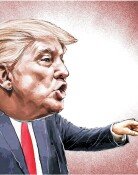Lessons from the Ireland crisis
Lessons from the Ireland crisis
Posted November. 19, 2010 11:29,
Ireland, once known as the Celtic tiger, is struggling with a financial crisis and recession. Its fiscal deficit-to-GDP ratio is an estimated 32 percent, more than 10 times the European Union recommendation of 3 percent. Irelands real economy will contract this year for the third consecutive year. Frequent fluctuations in the global financial market are caused by fears over a repeat of financial crises in certain European nations including Ireland.
Once considered an underdeveloped nation in Europe in the early 1980s, Ireland achieved rapid growth in the late 1980s through finance and IT. With huge business incentives and the advantage of being an English-speaking country, Ireland attracted massive global investment. Per capital income once exceeded the U.K.s by jumping from 10,000 U.S. dollars to 50,000 in 1990.
The Achilles heel of Ireland is a weak manufacturing base, however. The 2008 global economic crisis dealt a fatal blow to the country. The bursting of the real estate and financial bubbles battered the Irish financial sector, and foreign capital flight reached an estimated 80 billion euro. Unemployment jumped to 13.2 percent as foreign IT companies moved to other countries with lower labor costs like India. Hyundai Economic Institute in Seoul said in 2008, One thing that dragged down Irelands growth potential was its shift to a distribution-oriented policy after the country achieved 20,000 dollars in per capita income.
Ireland exemplifies the danger faced by a country highly dependent on the financial and service industries but weak in manufacturing and relying on foreign capital. Manufacturing power Germany, which was thought to have passed its prime in the 1990s, when Ireland was flourishing, has made a comeback as the continents growth engine. The German economy is expected to grow 3 percent this year, up from the previous forecast of 1.3 percent. Noboru Makino, former head of Mitsubishi Research Institute, spoke the truth when he said, Manufacturing is forever.
With the help of globally competitive manufacturers of electronics, cars, chemistry, steel and ships, Korea has recovered from the global economic crisis relatively faster. Finance-focused countries such as Ireland, Iceland and Dubai, which we thought of as role models in pursing the setup of a financial hub in Northeast Asia, got into trouble, Cambridge University professor Chang Ha-joon said. We should stay vigilant against giving up on manufacturing to focus on finance, he added. That does not mean the finance and service industries should be neglected, but Korea should keep strengthing its manufacturing industry.







